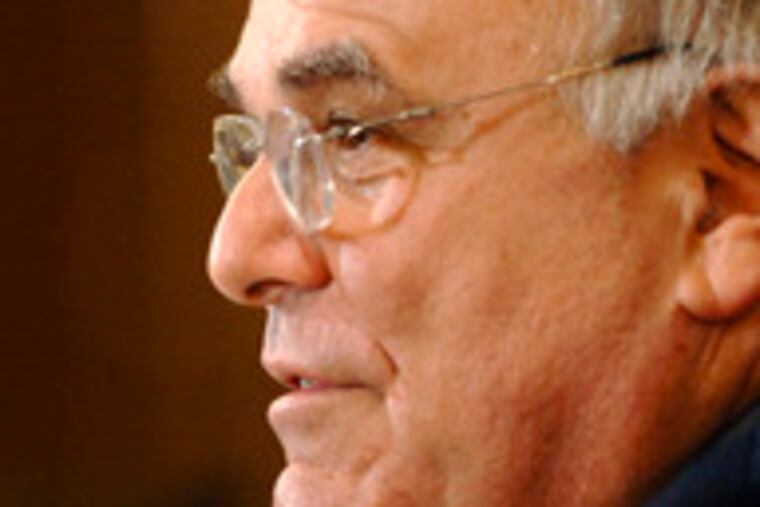Rendell proposes slew of changes
HARRISBURG - In the Capitol-wide race to improve government accountability and openness, Gov. Rendell yesterday saw the legislature's bid and raised it - dramatically.

HARRISBURG - In the Capitol-wide race to improve government accountability and openness, Gov. Rendell yesterday saw the legislature's bid and raised it - dramatically.
Limit campaign contributions. Expand access to government records. Set term limits for lawmakers. Shrink the legislature. Change the way legislative districts are drawn. Choose judges through a "merit" system instead of electing them.
These were among the far-reaching proposals Rendell presented yesterday as a way, he said, to restore the "public's trust" after the uproar over the 2005 legislative pay raise, and more recent revelations of lavish legislative bonuses and exorbitant spending by the state's college loan agency.
Some of the proposals have been on the table in Harrisburg for months or years. Taken together, though, they constitute what one scholar said was the broadest call for change from any Pennsylvania governor in memory.
"In recent history, I don't know another governor who has proposed such wide-ranging structural changes to state government," G. Terry Madonna, a Franklin and Marshall College professor and pollster who tracks state politics, said last night.
"Reform is about opening up the process and making government better," Rendell said in a nearly hourlong speech to the Pennsylvania Press Club.
Rendell said he wanted to allow greater access to government records by shifting the burden of proof from the person requesting information to the agency holding it. Pennsylvania's open-records law has been rated one of the least "open" in the nation.
Rendell said that because of the constraints of current law, his administration denied half the 5,000 right-to-know requests received since he took office in 2003.
He tied his term-limit proposal to what he considered the urgent need for gun-control legislation.
His voice rising, his fist pounding the dais, Rendell said that if lawmakers were true "citizen soldiers," Pennsylvania might finally be able to enact a law halting straw purchases of handguns.
Speaking on a day when Philadelphia recorded its third gun killing in 24 hours, Rendell said that if lawmakers' terms were limited, they might be less fearful of the gun lobby and more likely to support a long-stalled proposal to limit handgun purchases to one a month.
"That law should be passed," Rendell said. "No one who is sane and rational would vote against one handgun a month."
Rendell proposed establishing a commission to study reducing the size of the General Assembly - the largest full-time state legislature in the nation, and with a $340 million operating budget, one of the costliest.
And he called for establishing independent commissions to handle legislative reapportionment - a system historically controlled by the party in power and designed to protect incumbents.
Under Rendell's campaign-finance proposal, individual contributions - now unlimited in the state - would be capped at $5,000 for all statewide races and for races in bigger cities such as Philadelphia, and at $2,000 for all other elections.
The irony of having one of the most prolific fund-raisers in all of Democratic politics proposing those limits was not lost on Rendell or his critics, coming as it did in his final term and after Rendell said he would not run for office again.
Most of Rendell's proposals would require amending the state constitution - which means bills must pass the General Assembly in two consecutive sessions and then be placed on the ballot for approval by voters. Rendell wants the proposals to become law by the 2012 election.
The likelihood that at least some of Rendell's proposals would reach the floor this spring is fairly good, given the momentum created by House Speaker Dennis O'Brien's bipartisan Reform Commission, which was the driving force behind a slew of important rules changes approved this month.
O'Brien's panel came to life after the 2005 legislative pay raise prompted enough public furor to get some incumbents booted from office in last year's elections. Bills addressing each item on Rendell's list have been introduced in either the House or the Senate, where many rookie legislators won office last year running as reformers.
"Between the standing committees and the reform commission, all his ideas will get a good review," said Bill Patton, O'Brien's spokesman.
Senate Majority Leader Dominic Pileggi (R., Chester) plans to introduce an open-records bill this week and said he would examine Rendell's campaign-finance proposal.
Pileggi does not support the governor's call for merit selection of judges. "Many citizens cherish the right to elect judges, and I'm not sure they want to give up that right," said Erik Arneson, Pileggi's spokesman.
Critics are quick to point out that it took Rendell four years to announce his vision for changing state government, almost two years after the pay-raise debacle and after the Senate and House instituted their own internal rules changes.
"Gov. Rendell is no champion of reform in the way that he wants to portray himself now," said Matthew Brouillette, president of the Commonwealth Foundation, a conservative Harrisburg think tank. "He's a good politician who knows he needs to ride this wave and is carrying other issues on his agenda with him."
Also yesterday, Sen. Jeffrey Piccola (R., Dauphin) held the second of three hearings on whether to hold the state's first constitutional convention in 40 years, during which lawmakers would likely consider many of Rendell's proposals.
Rendell said yesterday he opposed such a convention, because it would be too difficult to limit the scope of the changes being debated, which could jeopardize the process.
Piccola said the convention would likely be structured to limit proposals under consideration.
Rendell's Proposals
Open records
Selection of judges
Campaign finance
Legislative reapportionment
General Assembly size
Term limits
SOURCE: Associated Press
EndText